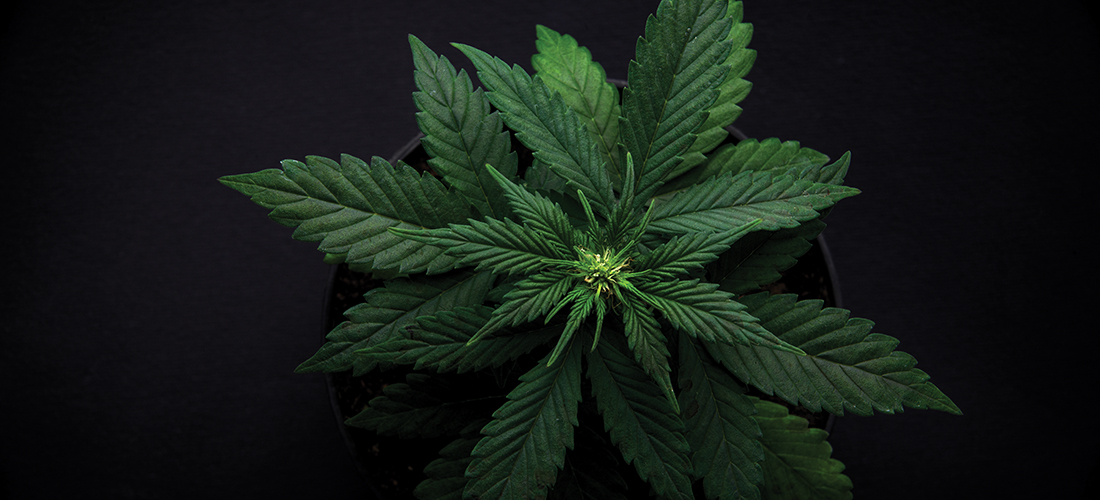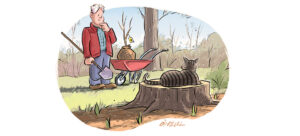
Coming to a Field Near You?
How hemp may save the family farm
By Jan Leitschuh
There’s a new kid in town, one whose arrival holds promise for Tar Heel agriculture. Don’t look for it to be a kitchen garden crop anytime soon, at least in North Carolina (although California allows six plants cultivated for personal use). Legally, you and I can’t grow it. But last summer, some N.C. farmers — including a Sandhills producer — cultivated this robust new crop in a groundbreaking pilot program.
Yep, we’re talking about cannabis. In North Carolina that “new kid” is industrial hemp. Last year saw the planting of legal hemp in North Carolina for the first time in decades. With the loss of tobacco as a cash crop, the state hopes hemp will fill the gap, especially in view of the strong and growing worldwide demand for hemp products.
Before the cute comments about “wacky weed” begin, know that this agricultural program has the full support of our state government, in hopes of providing a sturdy and profitable crop for N.C. farmers. Demand for hemp products is high in the U.S., but until recently hemp production has been severely limited due to Federal Drug Enforcement laws.
This climate is shifting. And some say that N.C. is strategically positioned to be the largest hemp-producing state in America in 2018.
While industrial hemp is the same species as the stoner’s marijuana (Cannabis sativa), industrial hemp is the non-happy strain. The buzz has been bred out. The two crops differ by their tetrahydrocannabinol (THC) content. THC is the psychoactive chemical that causes the high from marijuana. So, no personal joy in the industrial version. Hemp must have less than 0.3% THC, and plants with more than that are considered to be marijuana.
But word is slow to get around. One Sandhills farmer who grew about 15 acres under the pilot program prefers to remain anonymous because he had some theft of industrial hemp plants from his fields. Until the public at large understands that industrial hemp won’t get you high, this possibility remains an economic hazard for farmers.
True story: I have hemp roots. At one point, during World War II, my Minnesota grandfather was encouraged by the U.S. government to grow acres of hemp for fiber, to be made into rope for Navy ships. The hemp naturalized and spread along his prairie farm. When my cousin came to live with him during the late ’60s, she persuaded my grandfather — as far to the “stern elder” side of the generation gap as one could be — to dry a few leaves and smoke them in his pipe. He was disappointed: “I don’t see what all the fuss is about.” It was a low-THC industrial strain.
The N.C. hemp industry is in its infancy, and is highly regulated. To grow legal industrial hemp, farmers are required to submit an application, submit to crop testing, demonstrate they make the majority of their income from farming, slap down a $250 licensing fee, and agree to participate in the pilot program’s research. The new N.C. Industrial Hemp Commission is responsible for developing rules and licensing for the pilot program.
The Agricultural Act of 2014 allowed certain research institutions and state departments of agriculture to grow industrial hemp, as part of an agricultural pilot program. North Carolina State University, North Carolina A&T State University, and the N.C. Department of Agriculture & Consumer Services are all participants in the pilot program here. Research trials were planned at N.C. State research stations in Salisbury, Plymouth and Rocky Mount, and at the North Carolina A&T research farm in Greensboro.
A 2016 change in the law made agricultural production of industrial hemp possible here under the pilot program, but it has taken until last summer for the rules and regulations to be in place. The first statewide crop — a small, strictly regulated one — was harvested last fall from the mountains to the sea.
Hemp is and has been grown globally for millennia. Over 30 countries currently grow hemp for its stalks, seeds and flowers (the seed for N.C. originally came from an Italian strain). An impressive array of items can be manufactured from industrial hemp: fuel, seed oil and protein-rich food, clothing and other textiles, hemp plastics, fibers, hemp “milks” and beverages, paper, feed stocks, construction and insulation materials, even cosmetic products. Proponents say hemp can provide many of the raw materials we need as a society to function, and cleaner and greener. Hemp, for example, can provide four times as much pulp for paper with at least four to seven times less pollution than tree paper.
Our first five U.S. presidents were all hemp farmers. Despite hemp’s long cultivation history, however, the best agronomic practices of producing it have been lost due to decades of prohibition. This has led to a new cottage industry: hemp “universities,” courses that teach growers the basics of quality production.
Cannabis plants also produce cannabidiol, or CBD, an interesting phytochemical attracting strong medical interest lately. CBD oil is now legal in all 50 states, and is used to treat glaucoma, epileptic seizures, arthritis, neurological disorders, PTSD, depression, pain and other ailments. The oil is reported to have anti-inflammatory, antioxidant and anti-nausea properties. It is sold in a number of locations locally.
One company, Hemp, Inc., is interested in high-value CBD production, and has planted in Franklin and Nash counties, along with acreage in Kentucky, Colorado, Nevada and Oregon. The company recently bet large on N.C., building the largest industrial hemp commercial processing facility in North America in Spring Hope. The 70,000-square-foot facility also has a massive CO2 supercritical extractor, the state-of-the-art processing method for the CBD oil. The company contracts with local farmers to grow the product, which Hemp, Inc. then processes, packages and distributes.
The company’s promotional material is glowing, perhaps excessively. “The family farm, once a staple of the American landscape, is fast disappearing,” says Hemp, Inc.’s brochure. The company CEO, Bruce Perlowin, envisions a 5-acre farm with a cloning room, a greenhouse and 5,000 high CBD hemp plants. “By showing farmers how to grow high CBD hemp, operate a greenhouse and turn a barn into a cloning room to earn $5000,000 a year, the small family farm can reappear in the American landscape.”
In an article in the Rocky Mount Telegraph last summer, Perlowin said, “One plant equals one pound. If you don’t do anything but sell the bud to someone with a big extractor, you’re talking $50 to $500 a pound. What we do is a joint venture with local farmers to maximize their income.” The company even operates a Hemp, Inc. University to train its prospective growers.
Whether these gold rush numbers bear out or not, the fact remains that hemp seems to be as economically viable, if not more so, than tobacco, which provided a strong chunk of income to many farm economies. N.C. tobacco producers have greenhouses and other equipment that could convert to hemp production. Who knows? A useful crop with myriad applications in our modern world, hemp holds out hope for replacing both tobacco and petroleum-based manufacturing with greener products.
Stay tuned for further news as 2018’s harvest comes in next fall. PS
Jan Leitschuh is a local gardener, avid eater of fresh produce and co-founder of the Sandhills Farm to Table Cooperative.





